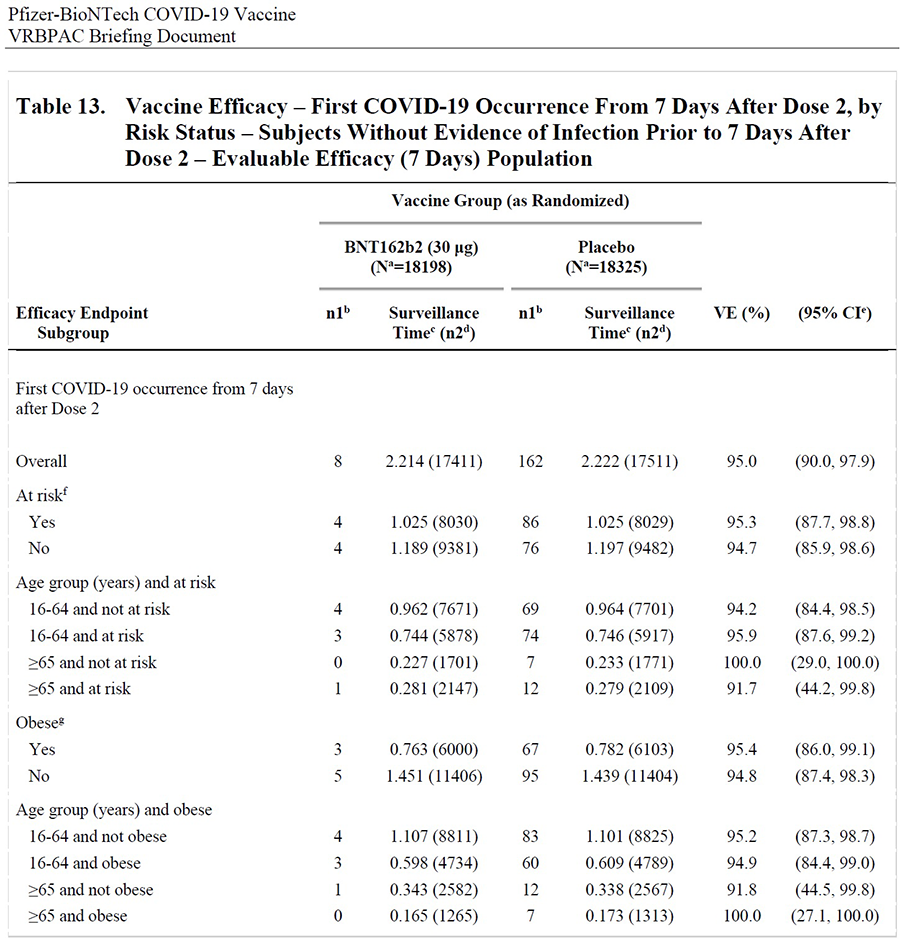*Please note: This post was originally published on ConscienHealth.org, produced by OAC National Board Member Ted Kyle, RPH, MBA.*
 Contrary to headline-grabbing speculation, data on the Pfizer COVID-19 vaccine tells us it works equally well in people whether or not they have obesity. This data comes from detailed briefing documents on the vaccine released on December 8th by the FDA. Up until now, the information on COVID-19 vaccines has been sparse – mostly press releases and speculation. Now we have real data and this data is impressive. Some experts are calling it a “grand slam.”
Contrary to headline-grabbing speculation, data on the Pfizer COVID-19 vaccine tells us it works equally well in people whether or not they have obesity. This data comes from detailed briefing documents on the vaccine released on December 8th by the FDA. Up until now, the information on COVID-19 vaccines has been sparse – mostly press releases and speculation. Now we have real data and this data is impressive. Some experts are calling it a “grand slam.”
In addition, the Oxford COVID Vaccine trial group published an interim analysis on another vaccine in the Lancet. Data on the Oxford vaccine is promising but leaves some questions unanswered. For example, a detailed analysis of efficacy in subgroups is lacking.
Speculation is No Substitute for Data
A few months ago speculation was rife in the press that “the obese” were going to “undermine the effectiveness of a COVID-19 vaccine.” Raz Shaikh told Kaiser Health News he saw “no way” to have a COVID-19 vaccine meet the needs of “the obese” by next year. Adding to the burden of misinformation, scientists speculated in a review article:
“A major concern is that vaccines will be less effective for the individuals with obesity.”
Thus, CNN reported that obesity “damages vaccine efficacy, study finds.” But there was no study. Just speculation.
 Now we have a study and it shows the speculation to be utterly false. Across the board, in every subgroup at risk, the vaccine appears to be equally effective. In people with obesity, the effectiveness is 95 percent, just as it is in people with a lower BMI. Older or younger, at risk for complication or not, all of these groups experienced similar efficacy.
Now we have a study and it shows the speculation to be utterly false. Across the board, in every subgroup at risk, the vaccine appears to be equally effective. In people with obesity, the effectiveness is 95 percent, just as it is in people with a lower BMI. Older or younger, at risk for complication or not, all of these groups experienced similar efficacy.
Obesity Action Coalition (OAC) President and CEO Joe Nadglowski emphasized the importance of relying on data, not speculation:
“We are glad to see this data, providing reassurance that this vaccine appears to offer equally good protection for people whether or not they have obesity. Speculation that this would not be the case was unhelpful. This reminds us that we need to rely on facts and data in dealing with obesity. Because often, obesity is not what we think it is.”
The Ethics of Speculation
Speculation can be dangerous in a pandemic if it is presented as a matter of fact. Speculation on both COVID-19 and obesity can serve as great clickbait, as ConsciehHealth explained back in August. But we don’t need more clickbait. What we really need is good information that draws a clear line between speculation and facts.
Blur the line and you’re spreading misinformation. In a pandemic, misinformation can be deadly.
You can download the detailed briefing documents on the Pfizer COVID-19 vaccine here. The Lancet paper on the Oxford vaccine is here, along with a commentary here. Further perspective is available here, here, and here. Finally, for more on the dangers of misinformation in a pandemic, click here.
